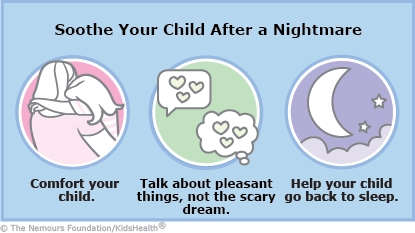Nightmares: How to Care for Your Child
You cannot completely prevent your child from having nightmares. But you can help your child get ready for a peaceful night's rest by having a relaxing bedtime routine.


A nightmare is a very scary or upsetting dream that usually wakes a person up. Like most dreams, nightmares happen during a stage of light sleep when the brain is very active. Health care providers call this the rapid eye movement (REM) stage because the eyes are rapidly moving beneath a person's closed eyelids. Most people have several REM stages each night. Nightmares usually happen during the later part of a night's sleep, when REM stages are longer.
Nightmares tend to happen most often in the preschool years, but people of all ages can get them. When the person wakes up, the strong emotions that the nightmares cause can make it hard to get back to sleep. Even older kids who know they aren't real can feel very upset by nightmares. Usually kids have fewer nightmares by the time they are teenagers.
Like all dreams, nightmares may be a way for the brain to work through thoughts and feelings that a person faces. It's not always obvious what leads to a nightmare. But kids are more likely to have nightmares when they are under stress, don't get enough sleep, take certain medicines or drugs, or drink alcohol.

-
Helping your child get a good night's sleep may help prevent nightmares. Make sure your child:
-
Keeps a regular bedtime and wake-up time.
-
Gets about 10–13 hours of sleep daily (including naps) if under 6 years old and 9–12 hours of sleep each night if older.
-
Has a relaxing nightly bedtime routine and avoids high-energy activities just before bed.
-
Avoids scary movies, TV shows, and stories before bed.
-
Does not have a TV in the bedroom.
-
Avoids caffeine (found in coffee, tea, chocolate, and sodas), which can disturb sleep.
-
If your child is confused about nightmares, explain that they aren't real and can't hurt anyone.
-
Ask if your child is feeling stressed, and then find ways to help.
-
If your child wakes up from a nightmare and calls for you:
-
Be calm.
-
Tell your child that the nightmare is over and the things that happened in it weren't real.
-
Don't spend a lot of time talking with your child about the details of the nightmare, as this can increase fear. Tell your child you can talk about it more in the morning if he or she still wants to.
-
Help your child go back to sleep. Depending on your child's age, you can offer a favorite stuffed animal or blanket, turn on a nightlight, play soft music, or talk about nice dreams your child would like to have.

-
Nightmares often keep your child from getting enough sleep.
-
Your child seems upset, angry, or withdrawn a lot.
-
Your child has behavior problems at home, at school, or with friends.